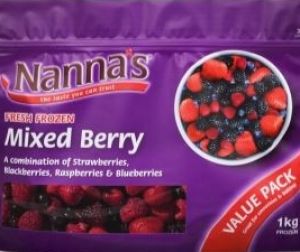There are many things you might expect to get when you go to the supermarket, but hepatitis isn’t normally one of them.
For what now looks like dozens of people, that is what happened after they bought imported frozen berries from China.
Hepatitis is a thoroughly unpleasant virus that attacks the liver. It causes jaundice, nausea and vomiting that can last up to eight weeks. Worse still, if you get the virus, you can pass it on to others before you have the symptoms, as it is highly infectious.
If that isn’t bad enough, consider the cause. In this case, the hepatitis has been transmitted in food which has been contaminated with feces.
 In buying imported foodstuffs people really could be running the risk of poisoning themselves to save a buck. Consumers need to think about where and how that imported food is produced. Photo: Penny Stephens
In buying imported foodstuffs people really could be running the risk of poisoning themselves to save a buck. Consumers need to think about where and how that imported food is produced. Photo: Penny Stephens
Exactly how that contamination occurred is not known, but given the number of people infected, it would appear to have happened on an industrial scale.
One thing is for sure, it wouldn’t have happened if the berries had come from Australia.
There is no shortage of good food produced in Australia – on the whole some of the world’s very best – yet we keep importing more and more food from overseas.
One of the reasons for this is that supermarkets are keen to create their own brands, so they can control the food chain.
In doing so, the supermarkets have no hesitation in squeezing Aussie farmers out of the market if they can buy produce cheaper overseas. That ultimately means squeezing Aussie farmers off their farms.
The supermarkets have been doing this for years, alongside a number of other unconscionable practices, as I wrote last year.
But the greater concern should be the health risks to which their corporate rapaciousness exposes consumers.
The supermarkets make noises about stocking good food, but they cannot have the same degree of confidence in food safety and hygiene if the product comes from overseas.
Australian food producers have some of the highest standards of food safety in the world. It is rarely so in many places where imported food is produced, especially in Asia.
As someone who does a lot of Chinese cooking, I always worry when an ingredient isn’t made here in Australia. Given the choice I will always buy Australian produce, because it’s how I keep my family safe.
This is a message the Queensland Farmers Federation want people to understand.
“Our farmers are happy to produce things to the very highest standards, and pride themselves on it. People need to understand that, and we want consumers everywhere to support Australian produce,” says Brad Pfeffer of the QFF.
“It’s not only for the good of the economy, regional employment and farmers, but for their own benefit as well. Consumers can have plenty of confidence in the local product, and its worth paying a little more for.”
Sadly, although shoppers often say they believe in buying Aussie made produce, they often choose cheaper foreign products when they get to the shopping aisle.
But in buying imported foodstuffs people really could be running the risk of poisoning themselves to save a buck. Consumers need to think about where and how that imported food is produced.
As Brad Pfeffer says, “People need to read the label and take the time to think about where their dollar is going, and what quality it is buying.”
As those people who have been contracted hepatitis have sadly discovered, the price you pay isn’t always the one printed on the sticker; sometimes it is your health or the health of your family.
Maybe we need to all think about that each and every time we go to the shops.
 Patties recalled Nanna’s one-kilogram bags of frozen mixed berries and frozen raspberries, and Creative Gourmet 300- and 500-gram bags of mixed berries. Photo: Mex Cooper
Patties recalled Nanna’s one-kilogram bags of frozen mixed berries and frozen raspberries, and Creative Gourmet 300- and 500-gram bags of mixed berries. Photo: Mex Cooper
